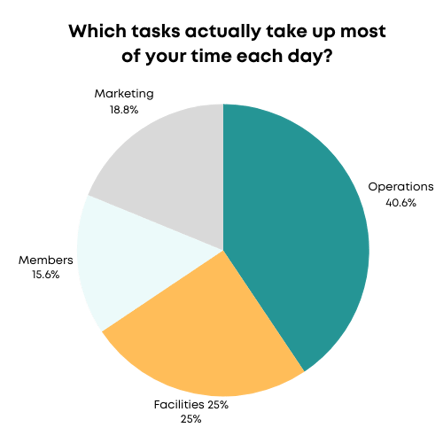This is an installment in an ongoing series highlighting statistics from a recent survey of coworking space operators and managers. The goal is to illustrate the scope of their daily responsibilities.
First, we asked what operators love to do in their job. Then we asked what they actually do most often. As will likely come as a surprise to zero hands-on managers, they are not the same thing.
When asked, "Which tasks actually take up most of your time each day?", the responses pointed to a heavy balancing act.

The first question in the survey was to find out which activities the operators enjoyed most. And it’s not surprising that, while member interaction is operators' favorite activity, it accounts for a small fraction of their workload. Tending to the engine of community and events takes a backseat to administrative necessities like selling, billing, and cleaning.
Operational tasks refer to the engine that keeps spaces running — invoicing members, processing payments, maintaining contracts and paperwork, coordinating with partners, etc. These unglamorous but vital activities eat up the lion's share of most operators' days.
Facility management also demands constant attention in the form of janitorial work, equipment upkeep, supply logistics, building infrastructure issues, security, and more. Coworking spaces function not just as offices but as bustling community hubs too. That means lots of wear-and-tear.
Marketing and promotional work is non-stop as well. Successful operators focus heavily on social media engagement, digital advertising, email campaigns, referral programs, partnerships, and events to keep growth on track.
Finally, member interaction includes sales meetings, tours, onboarding new members, consultations, hosting events, building relationships, and being the face of the space. Operators cherish this role yet struggle to make time for it.
According to 71% of respondents, better software tools represent the number one thing that could help them run their locations more efficiently. In particular, automated billing, access control, visitor management, analytics, maintenance tracking, etc. can drastically reduce hours spent on administrative work.
Platforms like Coworks synchronize all operational data points in an easy-to-use dashboard. Managers gain timesaving insight for billing, space usage metrics, leads and inquiries, service requests, accounting, and more, with just a few clicks.
Automating grunt work not only benefits operators in achieving work-life balance but also enables them to redirect focus toward member relations and community building — the very heart of the coworking model.
Despite enterprise-level demands, the average coworking space still relies on simple spreadsheets or paper systems for managing much of their work. Adopting more robust operational platforms represents the next stage in the industry's maturation.
The survey statistics reveal opportunities for managers to drive efficiency through technology while staying anchored to real human relationships. As the hybrid work revolution continues accelerating, expect coworking software and automation to help community-focused spaces differentiate themselves even more boldly.
Stay tuned for the next article analyzing goals and strategies operators employ to nurture their communities in this data-driven age, while preserving the spirit of coworking.
